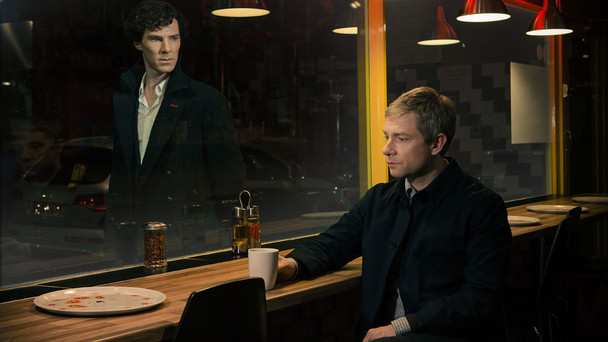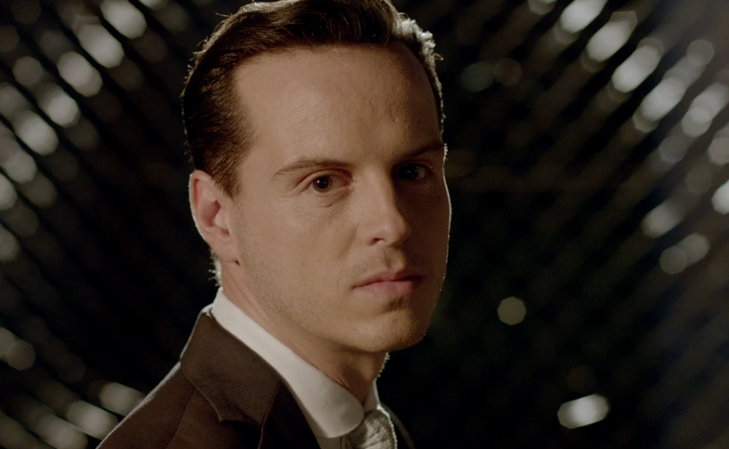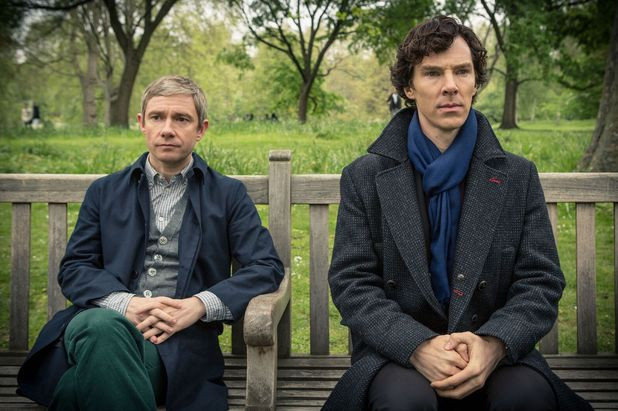Sherlock: Benedict Cumberbatch, Martin Freeman and Steven Moffat on Series 3 Finale, Sherlock the Murderer and Moriarty's Return

Sherlock co-creator Steven Moffat and his stars Benedict Cumberbatch and Martin Freeman have spoken about the events of series 3 finale His Last Vow, the return of Moriarty and when the show will return.
Speaking to IGN following series 3's culmination in the United States, they spoke about Andrew Scott's take on the classic villain set to return in series 4, Sherlock's near-death experience, his decision to kill Charles Augustus Magnussen and the great detective's relationship with his brother Mycroft.
Starting with the final episode's big twist, Freeman – who plays John Watson - talked about James Moriarty and his importance to the show. "There's something, A) about Moriarty that's so truly iconic, from Conan Doyle to our version and all the versions in-between, and B) about Andrew Scott's performance as Moriarty, which people f**king love - and I'm one of them," said the Hobbit star.
"I don't know if it was necessary, but I'm happy. [Laughs] Also, I know roughly how it works. I know roughly what will come as a result of it. I don't think people can get enough of a good villain, you know? These are reasonably heightened stories, albeit in a naturalistic arena I guess, but they're heightened stories where there's sort of goodies and baddies.
On when we last saw Moriarty, Moffat adds: "If you look at what actually happens in [series 2 finale] The Reichenbach Fall - never mind what seems to happen; pay attention to what did happen - Sherlock Holmes tricks him ruthlessly. I mean, he completely outclasses Moriarty actually, because Moriarty is the mad one.

"I think what Moriarty provides for Sherlock Holmes is permission to be a hero. I think Sherlock is troubled - not anymore - but when he says to Mycroft, 'Is there something wrong with us?' I don't think he's troubled about whether or not he's mad or evil. He meets Moriarty and thinks, 'No, no, no. I'm not that. Whatever I am, I am not that.' I don't think he even needs to beat Moriarty."
But audiences saw Moriarty shoot himself in the head, mere inches from Sherlock's shocked face. "I'm aware of what was in the frame," the show-runner said coyly. "We've always known what we were going to do with that story from the very beginning."
The other big talking point of series 3's climax was Sherlock murdering Magnussen in cold blood, having been driven to desperation and in a need to protect his friend's marriage. "That's why I wanted to write it. In the stories, where he's Milverton, Sherlock Holmes speaks with visceral hatred about him. It's quite shocking when you read it, and you think, 'I've never ever, ever heard him talk like that about anyone else.'
"There's also a running thread, which is that anyone who mistreats a woman in Sherlock Holmes stories, the original stories, causes Sherlock Holmes to fly into a rage. I don't know if Doyle did that on purpose or if it was Doyle's own personality coming out, but at one point he grabs a riding crop to administer a beating to somebody who's maltreated their daughter -- or step-daughter in that case. Bullies, he doesn't like them. It's a visceral, emotional response, and in Sherlock Holmes you're always looking for the moments when he gets emotional."

One of the episode's most memorable episode came in the few seconds between Watson's wife Mary shooting Sherlock and him hitting the ground. Taking place in Sherlock's mind-palace, the seconds turn to minutes as we see the inner-workings of a Sherlock faced with his own mortality.
Citing the particular moment when he happens across Moriarty, chained up in a dark corner of his brain, Moffat says: "The idea in the mind palace, it's not good advice so much as he's trying to avoid pain. He tries to imagine what Moriarty would say. In that moment, he remembers, 'Oh, never mind all that. I've got to get back and save John.' That's what he remembers. I think Moriarty, the reality is that he was easily outclassed by Sherlock in the end. He ran him close, but Magnussen ran him far, far closer."
On the relationship between Sherlock and older brother Mycroft (played by show co-creator Mark Gatiss), Cumberbatch says: "There's a very interesting dynamic that was exposed and developed throughout the season. They're in cahoots to some degree."
Comparing the relationship to the friendship between Sherlock and Watson, Cumberbatch says: "Martin is the everyman. Working with Mark [Gatiss], who plays Mycroft, becomes more stylized. They are removed from reality. It's really great when they're all together."
Moffat adds: "[Mycroft is] trying to look out for him. He's worried about him. He's worried about what his junkie little brother might do next, as you would be in real life. If your little brother or something wanted to be a detective, not a junkie anymore, now a detective, because crime is really fascinating, you'd be worried. He's worried, that's all."
You can read the interview in full - including what the three think of Sherlock's relationship with Janine and the detective's emotional journey acrosss series 3 - over on IGN.
© Copyright IBTimes 2025. All rights reserved.






















